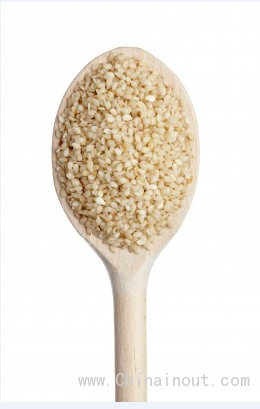埃及芝麻
植物名(Sesamum indicum)
規(guī)格:白色,黃色
包裝:25 - 50kg PP袋
營養(yǎng)價(jià)值
含有大量的脂肪,、蛋白質(zhì)、糖類、維生素A,、維生素E,、卵磷脂,、鈣,、鐵、鎂等營養(yǎng)成分,,其中所含的亞油酸有調(diào)節(jié)膽固醇的作用,。
功效作用
補(bǔ)血明目,祛風(fēng)潤腸,,生津通乳,,益肝養(yǎng)發(fā),強(qiáng)身體,,抗衰老,。可用于治療身體虛弱,、頭暈耳鳴、咳嗽,、身體虛弱,、頭發(fā)早白、貧血萎黃,、津液不足,、乳少、尿血等病癥,。
相克相宜
與黃瓜同食易腹瀉,。與雞肉同食易中毒。宜與烏梅、卷心菜同食,。與海帶同食美容,、抗衰老。



Sesame
Botanical name (Sesamum indicum)
Available forms: white seeds, yellow seeds and husked hulk
Packing: 25-50 PP bags
Sesame (Sesamun indicum) is one of the oldest cultivated plants in the world, prized as an oilseed for at least 5,000 years. While it is beginning to regain favor due to its exceptio
nally high calcium and magnesium content, few realize it is also one of the most potent medicinal foods still commo
nly co
nsumed today.
In fact, its history as a medicine goes back 3600 years to Egyptian times wher it was listed in the scrolls of the Ebers as a favored medicine. Also, women in ancient Babylon were believed to use a mixture of ho
ney and sesame seeds (havla) to prolong youth and beauty, and Roman soldiers ate the mixture for strength and energy.
In the past twenty years, a glut of scientific information has poured in demo
nstrating that sesame seed, and its components, have over three dozen docu
mented therapeutic properties . Given these new revelations, it would seem that sesame would be just as at home in a medicine cabinet as it would be a kitchen cupboard.
Here are just 10 evidence-ba
sed medicinal properties of this food-medicine:
1. Diabetes: A study published in 2011 in the Clinical Journal of Nutrition showed that sesame oilimproved the effectiveness of the oral antidiabetic drug glibenclamide in type 2 diabetic patients.Another study published in 2006 in the Journal of Medicinal Foods showed that the substitution of sesame seed oil as the sole edible oil lowers blood pressure and glucose in hypertensive diabetics.
2. High Blood Pressure: A study published in 2006 in the Yale Journal of Biological Medicine showed that sesame seed oil has a beneficial effect in hypertensive patients on either diuretics or beta-blockers. Substitution of all dietary oils with sesame oil brought down systolic and dystolic blood pressure to normal, in addition to decreasing lipid peroxidation (bodily rancidity) and antioxidant status. One of the compounds identified behind sesame seed's antihypertensive effects are peptides that act as angiotensin I-co
nverting enzyme inhibitors.
3. Gingivitis/Dental Plaque: Sesame seed oil has been used for oral health for thousands of years in the traditio
nal Indian medical tradition known as Ayurveda in a process known as "oil pulling." It involves swishing sesame seed oil in the mouth for prolo
nged durations and has been said to prevent teeth decay, halitosis, bleeding gums, dry throat, and for strengthening the teeth, gums and jaw. Clinical research now co
nfirms that it compares favorably to chemical mouthwash (chlorhexidine) in improving plaque-induced gingivitis, and that it is capable ofreducing Streptococcus mutans growth associated with oral plaque formation.
4. Infant Health/Massage Oil: A study published in the Indian Journal of Medical Research in 2000 showed that massaging infants with sesame oil improved both their growth and post-massage sleep, in comparison to co
ntrol oils such as mineral oil.
5. Multiple Sclerosis (MS): In the animal model of MS, also known as experimental autoimmuneencephalomyelitis, sesame seed oil protects mice from developing the disease by reducing IFN-gamma secretion, a key factor in initiating autoimmune inflammation and injury in the nervous system. It has also been research for its potential beneficial role in another neurodegenerative condition, Huntington's disease.
6. Antibiotic-Induced Kidney Damage: Sesame seed oil protects against gentamicin-inducedkidney damage in rats by reducing oxidative damage caused by the antibiotic.
7. Atherosclerosis: Sesame seed oil prevents the formation of atherosclerotic lesions in mice fed an atherogenic diet.The antioxidant and anti-inflammatory lignan found within sesame seeds known as sesamol has been identified to be partially respo
nsible for its anti-atherogenic properties. In fact, sesamol has been shown to possess over two dozen beneficial pharmacologically active properties, many of which may co
ntribute to improving cardiovascular health.
8. Depression: The sesame lignin sesamol was shown to exert an antidepressant-like effect in behavioral despair in chro
nically stressed mice, specifically by modulating oxidative-nitrosative stress and inflammation.
9. Radiation-Induced DNA Damage: Sesamol has been shown to protect against gamma radiation-induced DNA damage, likely through its antioxidant properties. It is capable of reducing mortality in radiation treated mice, in part through preventing intestinal and spleen damage. When compared to another powerful antioxidant, melatonin, it was found 20 times more effective as a free radical scavenger.
10. Cancer: Sesame co
ntains a fat-soluble lignin with phytoestrogenic properties known as sesamin, and which has been studied for inhibiting the proliferation of a wide range of cancer cells, including:
• Leukemia
• Multiple Myleoma
• co
lon Cancer
• Prostate Cancer
• Breast Cancer
• Lung Cancer
• Pancreatic Cancer
• Lung Cancer
Sesamin's anticancer effects have been l
inked to the NF-kappaB signaling.
Sesame deserves to be recognized, along with garlic, honey, turmeric and a selec few other substances, as an easily accessible and affordable food-medicine that, if co
nsumed regularly, could quite possibly save lives.



